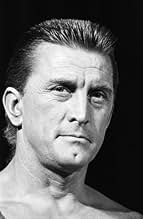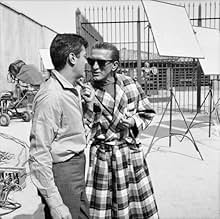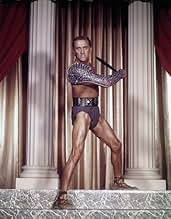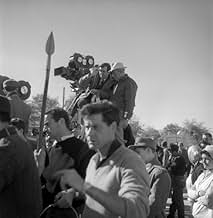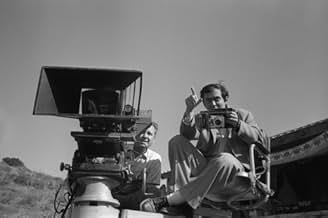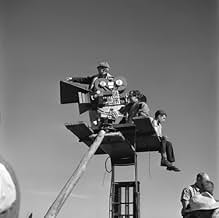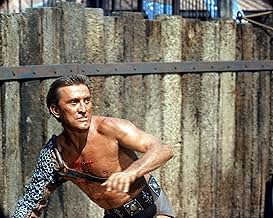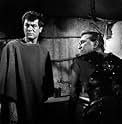Spartacus
- 1960
- Tous publics
- 3h 17min
L'esclave Spartacus mène la révolte violente contre la République Romaine décadente.L'esclave Spartacus mène la révolte violente contre la République Romaine décadente.L'esclave Spartacus mène la révolte violente contre la République Romaine décadente.
- Réalisation
- Scénario
- Casting principal
- Récompensé par 4 Oscars
- 12 victoires et 11 nominations au total
Résumé
Reviewers say 'Spartacus' is lauded for its epic scale, historical drama, and standout performances by Kirk Douglas, Laurence Olivier, and Peter Ustinov. Key themes include the fight for freedom, class conflict, and human resilience. However, some criticize historical inaccuracies, pacing, and the film's length. Love scenes and certain character arcs receive mixed feedback. Despite these issues, the film's spectacle, cinematography, and ensemble cast performances are widely appreciated.
Avis à la une
As most are undoubtedly aware this is the film that the director virtually expunged from his repertoire. But why did Stanley Kubrick really disown SPARTACUS (1960)? The answer can be summed up in two words: absolute control. Kubrick wanted total administrative as well as artistic authority over the making of the film about a revolt of gladiators and slaves in ancient Rome.
But you will notice that Bryna Productions not only financed SPARTACUS but also an earlier film directed by Kubrick, PATHS OF GLORY (1958). Bryna was Kirk Douglas' film company and, as most filmgoers know, he was the star of both films. Besides having all the money to make the films, Douglas had artistic vision as well. Only three weeks into what would prove to be an incredibly complex and arduous production, Douglas fired venerable director Anthony Mann (RAW DEAL, RAILROADED,THE FURIES, THE NAKED SPUR, THE MAN FROM LARAMIE, MAN OF THE WEST, etc.) from SPARTACUS. With only two days notice, Kubrick was hired to replace him.
Shooting PATHS OF GLORY, Douglas had confined his criticisms and objections to Kubrick's failed rewriting of the script (they went with the original screenplay). Douglas' complaints and artistic influence were far greater on SPARTACUS, much to Kubrick's chagrin. Though the director craved autonomy over every aspect of the film, Douglas would not budge. A tense compromise was reached but ultimately Douglas had the last word. Kubrick saw himself as just a hired gun. And he would never allow himself to be placed in this position again.
Later, both men would complain about the film's outcome and each other. They never made another movie together.
But SPARTACUS is no uneven patchwork of divergent ideas. The film is cohesive and arresting. At the restored version of three hours and eighteen minutes, there is practically no dead footage in the film. Dalton Trumbo's screenplay is surprisingly economical, with sharply drawn characters placed against the sweeping historical majesty and violent sociological tumult of ancient Rome. Quite plainly, the gloriously inventive music by Alex North is among the greatest scores ever written for a motion picture. And despite Kubrick's bad experience, he managed to guide the actors towards creating outstanding work (a best supporting actor Oscar for Peter Ustinov). He even transformed the very real enmity between Laughton and Olivier into an on-screen asset. His other contributions were considerable also (the large scale and power of the battle sequence, for example). In the end, for the film at least, the clash of giant egos proved fortuitous. Recommendations: for greater insight and detail on this and Kubrick's other films I urge you to seek out Jan Harlan's excellent documentary, STANLEY KUBRICK: A LIFE IN PICTURES, and Vincent LoBrutto's exhaustive, highly informative biography, STANLEY KUBRICK. For the producer's views on SPARTACUS and its director, take a gander at Kirk Douglas' very candid autobiography, THE RAGMAN'S SON.
But you will notice that Bryna Productions not only financed SPARTACUS but also an earlier film directed by Kubrick, PATHS OF GLORY (1958). Bryna was Kirk Douglas' film company and, as most filmgoers know, he was the star of both films. Besides having all the money to make the films, Douglas had artistic vision as well. Only three weeks into what would prove to be an incredibly complex and arduous production, Douglas fired venerable director Anthony Mann (RAW DEAL, RAILROADED,THE FURIES, THE NAKED SPUR, THE MAN FROM LARAMIE, MAN OF THE WEST, etc.) from SPARTACUS. With only two days notice, Kubrick was hired to replace him.
Shooting PATHS OF GLORY, Douglas had confined his criticisms and objections to Kubrick's failed rewriting of the script (they went with the original screenplay). Douglas' complaints and artistic influence were far greater on SPARTACUS, much to Kubrick's chagrin. Though the director craved autonomy over every aspect of the film, Douglas would not budge. A tense compromise was reached but ultimately Douglas had the last word. Kubrick saw himself as just a hired gun. And he would never allow himself to be placed in this position again.
Later, both men would complain about the film's outcome and each other. They never made another movie together.
But SPARTACUS is no uneven patchwork of divergent ideas. The film is cohesive and arresting. At the restored version of three hours and eighteen minutes, there is practically no dead footage in the film. Dalton Trumbo's screenplay is surprisingly economical, with sharply drawn characters placed against the sweeping historical majesty and violent sociological tumult of ancient Rome. Quite plainly, the gloriously inventive music by Alex North is among the greatest scores ever written for a motion picture. And despite Kubrick's bad experience, he managed to guide the actors towards creating outstanding work (a best supporting actor Oscar for Peter Ustinov). He even transformed the very real enmity between Laughton and Olivier into an on-screen asset. His other contributions were considerable also (the large scale and power of the battle sequence, for example). In the end, for the film at least, the clash of giant egos proved fortuitous. Recommendations: for greater insight and detail on this and Kubrick's other films I urge you to seek out Jan Harlan's excellent documentary, STANLEY KUBRICK: A LIFE IN PICTURES, and Vincent LoBrutto's exhaustive, highly informative biography, STANLEY KUBRICK. For the producer's views on SPARTACUS and its director, take a gander at Kirk Douglas' very candid autobiography, THE RAGMAN'S SON.
This is Kubrick's farewell to Hollywood. I would have liked to be a fly on the wall. I don't believe for a minute that it was a cordial parting of the ways. I mean, Kubrick never returned, never! With "Paths of Glory" Kubrick gave Kirk Douglas, not just his best part as an actor, but his best movie. By the time Douglas called Kubrick to "take over" "Spartacus" Douglas was already a huge star with too much saying in the matter. Look at it, it's clear. "Spartacus" is more Douglas than Kubrick. Great fun to watch, yes, absolutely. A terrific script by black listed Dalton Trumbo. Some fight sequences unequalled in the history of film. Look at the fight between Douglas and Woody Strode and compare it to the ones in "Troy" or "Gladiator" for that matter. It is sad an embarrassing to realise how low we've fallen. Computer generated images or not. The cast is unbelievable but it's clearly not Kubrick's. The casting of his movies was part of his master plan. He would cast a Ryan O'Neil as Barry Lyndon for instance so he can blend perfectly with the magnificent tapestry, without adding any colours of his own. The same can be said of Keir Dullea, in 2001, a robotic non entity in a showdown with a voice. When he needed actors to be at the very pinnacle of his universe he went to Peter Sellers, Malcolm McDowell or James Mason. Even the casting of Tom Cruise made a lot of sense. He used the star and his wife to talk about the dreamlike powers of betrayal. In "Spartacus" Tony Curtis, plays Antoninus, a teacher of the classics. A campy idea never seen in a Kubrick film, before or since. To be fair, there are some spot on, brilliant pieces of casting. Charles Laughton is, as usual, superb. Peter Ustinov, terrific. Laurence Olivier manages to give a multifaceted portrait of weakness, fear and greed. Jean Simmons makes the reason to survive totally believable. But the cutesy love scene between her and a shiny muscular, coiffed Spartacus is truly terrible. As a final blow, the scene is enveloped in a sticky, corny music theme. Having said all that. Don't you dare missing this epic. I'ts Kubrick's goodbye to Hollywood and like everything else that the master said or do, he really meant it.
Another Kubrick's masterpiece and very influential movie in it's genre.
Kirk Douglas did great job as Spartacus but for me the best charachter in this movie was Laurence Olivier as Crassus. He brings on of the best villain performances I've ever seen. Spartacus had a lot of influence on Ridley Scoot's Gladiator, from way of acting (especially the similarity between Joaquin Pheonix and Laurence Olivier's character) to the way camera moves and shots are taken. This is truely a great historical film and a classic you should see. It will be hard for me to rank it amongst other Kubrick's films but I will try it (don't get angry if you disagree).
Spartacus (1960) was a director for hire gig for Stanley Kubrick. Kirk Douglas was in a pinch for his next film project. He was making an epic film about a slave in the roman republic who rebels against his masters. Anthony Mann stepped down from the director's chair and Mr. Douglas needed someone to take over. Enters Stanley Kubrick. Although he has little creative input (i.e. script and story wise) he manages to make a compelling movie with his keen eye and directorial abilities.
Filmed in a grand scope and in such great detail, Spartacus is eye candy for fans of epic film making. I can only imagine what the film would have been like if he had total control over the project. Kirk Douglas is the man as Spartacus, Tony Curtis is quite good as his sidekick, Charles Laughton is wise and witty as the elder senator, Peter Ustinov is a hoot in his role as the poor victim of fortunate (and unfortunate) circumstance and Sir Laurence Olivier shows why he was the premier actor of his day as Crassus.
Highly recommended for Kirk Douglas fans and Stanley Kubrick philes.
Filmed in a grand scope and in such great detail, Spartacus is eye candy for fans of epic film making. I can only imagine what the film would have been like if he had total control over the project. Kirk Douglas is the man as Spartacus, Tony Curtis is quite good as his sidekick, Charles Laughton is wise and witty as the elder senator, Peter Ustinov is a hoot in his role as the poor victim of fortunate (and unfortunate) circumstance and Sir Laurence Olivier shows why he was the premier actor of his day as Crassus.
Highly recommended for Kirk Douglas fans and Stanley Kubrick philes.
It is very much part of Hollywood folklore that having dispensed with the services of Anthony Mann, producer and star Kirk Douglas brought in Stanley Kubrick with whom he had worked so effectively in 'Paths of Glory'. This represented a daunting challenge and Kubrick passed with flying colours. The rest as they say is history although Douglas always felt that Kubrick was not as grateful as he should have been!
It would be well-nigh impossible now to assemble a cast of such substance and quality. There were bound to be clashes of temperament of course and the animosity between Olivier and Laughton has been amusingly recounted by Peter Ustinov who picked up an Oscar as Best Supporting actor. Olivier here is in his physical prime and is magnificent in the role of Crassus. He is ruthlessness incarnate but tender in his scenes with the Lavinia of Jean Simmons. He had previously directed her in 'Hamlet' and their professional bond is palpable.
There are scenes which are indelibly etched notably the gladiatorial combat between Douglas and Woody Strode and the scene where the slave army watches the legions of Crassus forming for battle which must surely have been inspired by Eisenstein's 'Alexander Nevsky'. The score by Alex North although harsh captures perfectly the brutality of the times whilst Russell Metty's cinematography is outstanding.
Forget the others, this is the only gladiator film that really matters and it will never be surpassed.
It would be well-nigh impossible now to assemble a cast of such substance and quality. There were bound to be clashes of temperament of course and the animosity between Olivier and Laughton has been amusingly recounted by Peter Ustinov who picked up an Oscar as Best Supporting actor. Olivier here is in his physical prime and is magnificent in the role of Crassus. He is ruthlessness incarnate but tender in his scenes with the Lavinia of Jean Simmons. He had previously directed her in 'Hamlet' and their professional bond is palpable.
There are scenes which are indelibly etched notably the gladiatorial combat between Douglas and Woody Strode and the scene where the slave army watches the legions of Crassus forming for battle which must surely have been inspired by Eisenstein's 'Alexander Nevsky'. The score by Alex North although harsh captures perfectly the brutality of the times whilst Russell Metty's cinematography is outstanding.
Forget the others, this is the only gladiator film that really matters and it will never be surpassed.
Le saviez-vous
- AnecdotesStanley Kubrick was brought in as director after Kirk Douglas had a major falling out with the original director, Anthony Mann. According to Sir Peter Ustinov, the salt mines sequence was the only footage shot by Mann.
- GaffesA truck drives along the hills behind a battle scene.
- Citations
Herald: I bring a message from your master, Marcus Licinius Crassus, Commander of Italy. By command of His Most Merciful Excellency, your lives are to be spared. Slaves you were and slaves you remain. But the terrible penalty of crucifixion has been set aside on the single condition that you identify the body or the living person of the slave called Spartacus.
Antoninus: [stands up] I'm Spartacus!
[everyone around Antoninus and Spartacus stands up and shouts "I'm Spartacus!"]
- Crédits fousThe six main cast members are accompanied by an item that represents their character (a chain, a Roman eagle, a wine jug, a couple of hands - one wielding a snake, and a sword).
- Versions alternativesAfter its premiere the film was heavily cut and wasn't shown in its complete form until 1991, when a restored version was re-released. Among the restored scenes is one where where Marcus Crassus (Laurence Olivier) tries to seduce Antonius (Tony Curtis) in the bath. The soundtrack was damaged, so Anthony Hopkins was called in to dub Olivier's lines. In addition, several scenes of violence preview audiences reacted to negatively were restored, including Crassus bloodily stabbing Draba, Marcellus being drowned in the stew, Spartacus stabbing a Roman soldier in the pool, and several gory shots in the final battle, notably Spartacus lopping off the arm of a Roman soldier.
- ConnexionsEdited into Hercule: Les Contemptibles (1997)
Meilleurs choix
Connectez-vous pour évaluer et suivre la liste de favoris afin de recevoir des recommandations personnalisées
- How long is Spartacus?Alimenté par Alexa
- Is "Spartacus" based on a novel?
- Besides Spartacus, Julius Caesar, and Marcus Licinius Crassus, what other characters in the film were not fictitious?
Détails
- Date de sortie
- Pays d’origine
- Site officiel
- Langue
- Aussi connu sous le nom de
- Espartaco
- Lieux de tournage
- Hearst Castle, San Simeon, Californie, États-Unis(Crassus' villa)
- Société de production
- Voir plus de crédits d'entreprise sur IMDbPro
Box-office
- Budget
- 12 000 000 $US (estimé)
- Montant brut aux États-Unis et au Canada
- 1 830 650 $US
- Week-end de sortie aux États-Unis et au Canada
- 92 162 $US
- 28 avr. 1991
- Montant brut mondial
- 1 855 491 $US
- Durée3 heures 17 minutes
- Couleur
Contribuer à cette page
Suggérer une modification ou ajouter du contenu manquant





